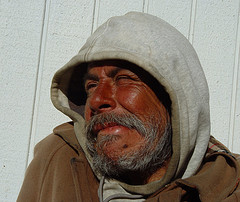 As we watch the economy spiral seemingly out of control, the specter of homelessness looms disturbingly close for people of all socioeconomic strata. Add in the chaos in the American housing market, and the picture becomes starkly unpleasant.
As we watch the economy spiral seemingly out of control, the specter of homelessness looms disturbingly close for people of all socioeconomic strata. Add in the chaos in the American housing market, and the picture becomes starkly unpleasant.
It’s a simple fact that we are seeing the number of the homeless grow, and it is disturbingly easy to end up on the streets. Right now, in Colorado, thousands face this possibility as the wildfires ravage the state. I know that feeling well from personal experience. You see, I am a native of New Orleans.
Just over five years ago, hurricane Katrina hit the city, and then the next morning the levees failed, flooding New Orleans. My wife and I had just emptied our savings account to pay for our wedding and honeymoon, and the checking account was low because it was a few days before payday. We ended up evacuating across the country with a total of about $200 and no vehicle.
With our friends, family and support network also scattered across the U.S., things became scary in very short order. Thanks to a few friends in other states we did not lack for a roof, but, as the weeks dragged on, the situation became more and more uneasy. I had a broken hand at the time, and so most earning opportunities were not viable. I was able to pick up a few bucks here and there, but nothing resembling enough income for a fresh start.
It was weeks before we had any inkling of whether we would be able to return to the city, much less whether anything we owned had survived. My then fiancee and I had a backpack of clothes each, a laptop, and our five cats. Things looked bleak.
“What about those legendary FEMA checks for $2,000 that everyone got?” you might ask. Not everyone got assistance, I know I sure didn’t. The Red Cross in New York helped us out with some clothes and a few hundred dollars. Let me tell you, you’ve never seen just how little $300 really is until it is all you have.
I will never forget having to swallow my pride and extend my hand for aid. We made it through thanks to the generosity of friends and strangers in Indiana and New York, but the awareness of the precipice was never absent from my thoughts. A few days before, everything was great: the wedding expenses were paid, I had a great new job, and we had just moved into a new apartment. Then, suddenly, it was all gone, taking all of my social resources with it.
We were very lucky. We made it back to NOLA six weeks after the disaster had struck — to find that most of our stuff had survived. It could easily have gone the other way, leaving us homeless. For many, it did. I will never forget the fear in my heart during those times.
Just about anyone is susceptible to the whims of Mother Nature, and she can take the roof from over your head in a heartbeat. Whether it is the levee failures in NOLA, wildfires in Colorado, or some other species of disaster — it can happen to you.
Of course, due to my experience, this is what I think of first, but there are many other causes of homelessness. The Walk For The Homeless website enumerates a number of factors, including job loss:
As someone who has been homeless, I can tell you that loss of employment is one reason people, even whole families, become homeless. This is more likely to occur when there is only one wage earner in the family, if employment is seasonal such as construction or lawn maintenance, or if you both work and each earns only minimum wage. While there is usually a combination of reasons why people become homeless a particular one often stands out: illness. Injury, sickness, and even mental illness can lead to being fired, laid off or replaced. Most of the time if you’re not able to do the work, you are out of a job. When you live from paycheck to paycheck, sometimes all it takes is to miss one or two paychecks and you can end up homeless. This is especially true if you have no friends or family to turn to for help.
Drawing on this information, Drea Knufken at Business Pundit boils things down into the Five Ways to Become Homeless, a list of things and situations that can leave you living on the streets. She also makes a very apt cultural observation:
Homelessness in the United States has always struck me as particularly painful. Penury is not well tolerated in the Land of Opportunity. People think money is easy to come by here, giving extreme poverty an especially powerful stigma.
In some countries, the homeless are seen as being cursed. In America, we do the cursing ourselves, labeling homeless people as lazy — one of Calvinistic capitalism’s direst sins.
The truth is that most homeless people know how to work hard.
This cultural perception is often borne out by observing the way that the majority of people treat the homeless when they encounter them on the streets. Not always, thankfully, but quite often.
Illness, job loss, foreclosure, or natural disaster — all can be harbingers of an upcoming life on the streets. It is worth remembering that these faces could be your own, and it would not take as much as you might think to end up there.
Source: “Why Do People Become Homeless?,” Walk For The Homeless
Source: “5 Ways to Become Homeless,” Business Pundit, 08/15/08
Image by Franco Folini, used under its Creative Commons license.
Visit Us on Facebook: Humane Exposures Publishing , downTownUSA, Maggots in My Sweet Potatoes, It’s More Expensive To Do Nothing










